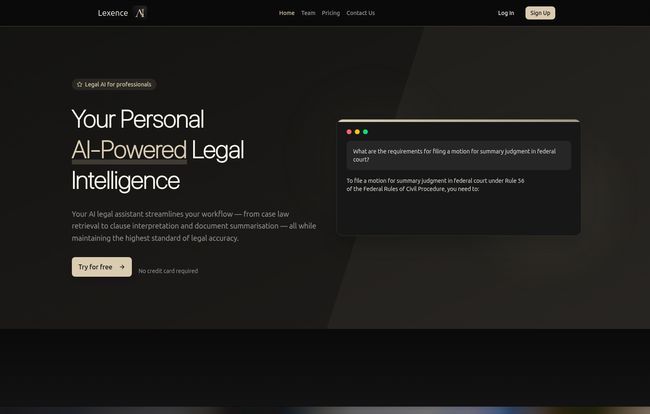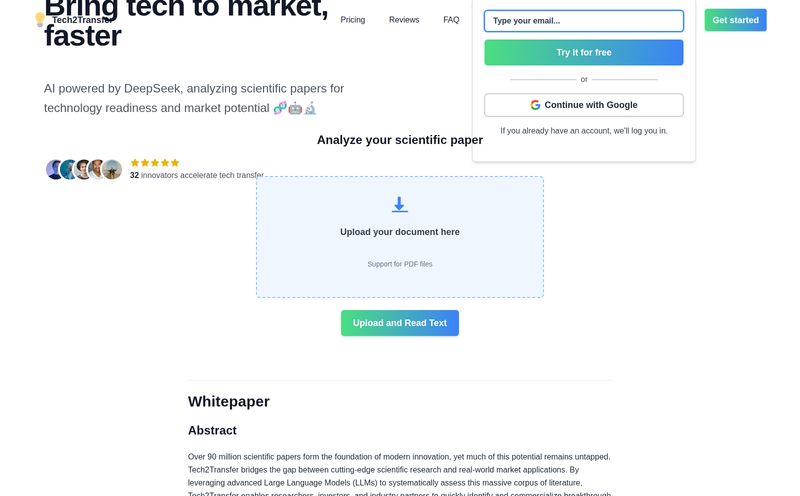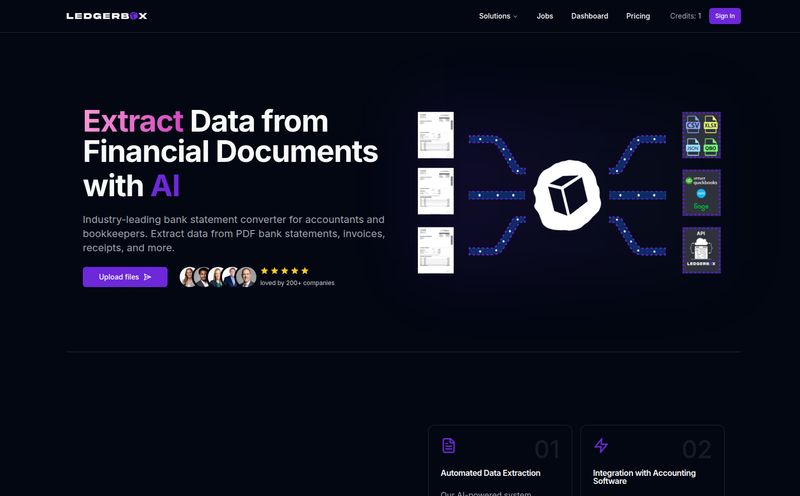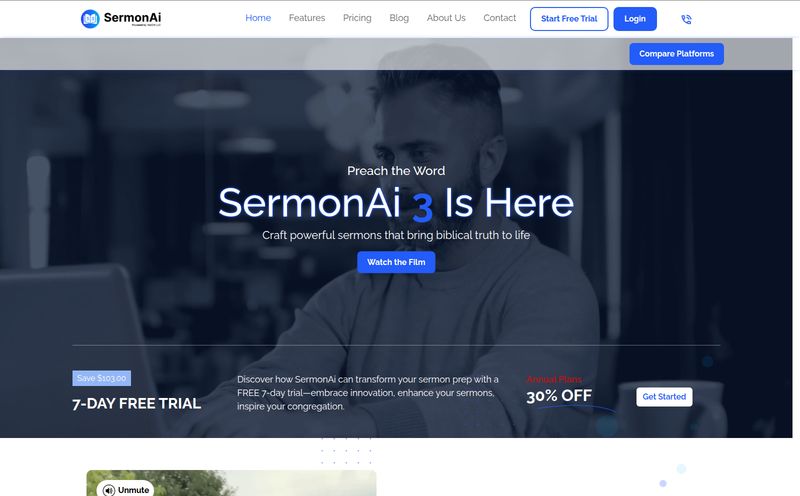How many of you have found yourselves, late at night, surrounded by towers of documents, with eyes so blurry you could mistake a tort for a torte? I’ve been there. Not as a lawyer, but in the trenches of SEO and data analysis, where a single missed detail in a sea of information can torpedo a whole campaign. The grind is real, no matter the profession. We're all searching for that magic bullet, that tool that gives us back our most precious resource: time.
For years, the legal world has been… let's say, traditional. It's an industry built on precedent, painstaking research, and the unassailable expertise of the human mind. But the AI wave is crashing on every shore, and the legal field is no exception. I’ve seen dozens of AI tools pop up, all promising to revolutionize everything. Most of them are just shiny wrappers on a basic algorithm. But every now and then, something comes along that makes me sit up and pay attention. Today, that something is called Lexence.
It bills itself as a “Personal AI-Powered Legal Intelligence,” which is a fancy way of saying it’s an AI assistant specifically built for legal work. And I have to say, after kicking the tires, it’s more than just a chatbot that knows a few legal terms.
So, What Exactly is Lexence?
Imagine having a junior associate who has read every case, every statute, and never needs to sleep or take a coffee break. That's the vibe Lexence is going for. It’s designed to be a first-stop for a whole range of legal tasks that usually eat up the clock. We're talking about digging through mountains of case law, making sense of a dense 100-page contract, or even just trying to get a quick, accurate summary of a specific statute.
It’s not trying to be your lawyer. That’s a key distinction and one of the first things I look for. It's a force multiplier. One of the testimonials on their site from a guy named Roni, a VP of Legal, said it was “like having a junior team member who never sleeps.” That’s not just good marketing copy; it genuinely captures the essence of what this kind of tool should be. It handles the grunt work, freeing up the actual human lawyers to do the high-level thinking, strategizing, and client-facing work that no AI can replicate. At least, not yet.
Getting My Hands Dirty: My First Look at Lexence
The first thing that stood out to me? The signup. It's currently in an open beta, and they mean it. You can sign up for free. No credit card, no shady “cancel before 7 days or we’ll charge your firstborn” clauses. This, in my book, shows a ton of confidence in their product. They’re betting that once you try it, you’ll see the value.
Once inside, the interface is clean. It's not intimidating. It's basically a sophisticated, focused chat window. You ask, it answers. You upload a document, it analyzes. This simplicity is deceptive, because the engine underneath is doing some serious heavy lifting.
Putting the AI Assistant Through Its Paces
Okay, so it looks nice. But can it do the job? I decided to explore some of its main features based on what a typical legal professional might need.
Diving into Legal Research Without Drowning
Anyone who’s ever used traditional legal search databases knows they are powerful but can also feel like trying to drink from a firehose. You get thousands of results, and you still have to spend hours sifting through them to find the one golden nugget you need. Lexence approaches this differently. You can ask a natural language question, like the example on their homepage: “List the requirements for filing a motion for summary judgment in federal court under Rule 56.”
Instead of just dumping a list of cases on you, it provides a structured summary. It pulls from reliable sources and, most importantly, shows its work. It gives you the context and proper referencing. It's less of a blind search engine and more of a research assistant that presents its findings in a neat, usable package. It's the difference between being handed a 500-page book and being handed the book with all the relevant pages already highlighted and summarized. Huge difference.

Visit Lexence
The Document Review and Summarization Beast
This is where I think Lexence really shines. The sheer amount of time legal teams spend reviewing documents—contracts, memos, discovery files, you name it—is astronomical. With Lexence, you can upload a PDF and just start asking questions. “Summarize the key obligations for Party A in this agreement.” “Are there any liability clauses that seem unusual?” “Pull out all the dates and deadlines mentioned.”
An in-house counsel for a fintech startup mentioned on their site that what used to take hours of review now takes minutes. I believe it. This feature alone could justify the cost of the tool once it moves to a paid model. It turns a marathon reading session into a quick Q&A. That’s not just a time-saver; it's a sanity-saver.
Crossing Borders with Jurisdiction-Agnostic Support
For any firm or company that doesn’t operate in a single, neat little box, dealing with laws from different states or even countries is a constant headache. Lexence claims to have jurisdiction-agnostic support. Now, I’d be careful here and always double-check with local counsel, but the ability to quickly pull up precedents and regulations from various jurisdictions without switching between a dozen different tools is a massive workflow improvement. Thomas B., a Legal Ops Manager for an NGO, praised this feature specifically. For international organizations, that’s a game-changer.
Who Should Be Using Lexence? And Who Shouldn’t?
I see this being a fantastic tool for a wide range of people. Solo practitioners and small firms who don’t have a huge support staff could use this to level the playing field. In-house legal teams can use it to speed up contract review and internal research. Paralegals and legal assistants can become ridiculously efficient, handling a much larger volume of preliminary research. I could even see law students using it to understand complex topics faster (responsibly, of course!).
But let's ground ourselves in reality for a second. This tool is not going to replace a seasoned lawyer. It doesn't have intuition. It can't read a judge's mood or strategize for a complex litigation. It’s an information processing machine, a very, very good one, but it's not a substitute for human experience and judgment. Anyone who thinks they can just fire their legal team and use an AI is in for a rude awakening. It's a tool, not an oracle.
What's the Damage? A Look at Lexence Pricing
This is the best part, for now anyway. The current pricing is… well, it’s free.
| Plan | Price | Details |
|---|---|---|
| Beta Access | $0 / month | Limited to 20 messages per day, includes access to U.S. legal code, document analysis, PDF upload, and legal research assistance. |
This is a limited-time offer while they're in beta. The 20-message-per-day limit is generous enough to get a real feel for the platform and even use it for some light daily tasks. They explicitly state that “Premium Plans” are coming soon, which will likely feature unlimited messaging and more advanced capabilities. My advice? Get in now while it’s free. You get to test-drive a potentially powerful tool at zero risk.
My Final Verdict: Is Lexence a Gimmick or a Game-Changer?
I've seen a lot of AI tools, and my hype meter is pretty well-calibrated. Lexence gets a solid nod of approval from me. It’s practical, well-designed, and tackles a very real, very expensive problem in the legal industry: the time-suck of research and document review.
It's not perfect, and the reliance on AI means you can't just blindly trust every output—you still need a qualified human to verify. But as an assistant? As that junior team member who never sleeps? It's incredibly promising. It feels like one of the first legal AI tools that was designed by people who actually understand the day-to-day workflow of a legal professional.
If you're in the legal space, from a first-year associate to a seasoned partner, I think you owe it to yourself to sign up for the free beta. Spend an afternoon with it. Upload a contract you’ve already reviewed and see if it catches the same things you did. Ask it a research question that gave you a headache last week. The worst-case scenario is you spend 30 minutes playing with a new toy. The best-case scenario? You just found your new favorite colleague.
Frequently Asked Questions about Lexence
- Is Lexence really free to use?
- Yes, for now. Lexence is currently in an exclusive beta period where you can use its features, including document analysis and legal research, for free. This is a limited-time offer, and they plan to introduce premium paid plans in the future.
- Can Lexence replace my paralegal or junior associate?
- No. Lexence is designed to be a powerful assistant, not a replacement for human professionals. It automates time-consuming tasks like preliminary research and document summarization, but it lacks the critical thinking, strategy, and nuanced judgment of a human lawyer or paralegal.
- How is Lexence different from using a general AI like ChatGPT for legal work?
- Lexence is a specialized tool trained specifically on legal data and workflows. It's designed for legal accuracy, provides contextual summaries with proper referencing from reliable sources, and includes specific features like document analysis and multi-jurisdiction support. General AIs are not fine-tuned for the specific accuracy and sourcing requirements of legal work and can be unreliable.
- Is my client's data secure when I upload a document?
- Lexence states on their site that they offer Enterprise-Grade Security. As with any cloud-based tool, you should review their privacy policy and terms of service, especially when handling sensitive client information. However, their focus on professional users suggests they take security seriously.
- What jurisdictions does Lexence support?
- The platform is described as having jurisdiction-agnostic support, which is a significant benefit for professionals dealing with laws across different states or countries. The beta plan specifically mentions access to the U.S. legal code database, but testimonials suggest its capabilities extend beyond that.
- What happens when the beta period ends?
- Lexence has stated that they will be introducing premium paid plans after the beta period. While details aren't public yet, these plans will likely offer features like unlimited messaging, priority support, and even more advanced analysis capabilities. Beta users will likely be the first to know about the new plans and any potential introductory offers.



